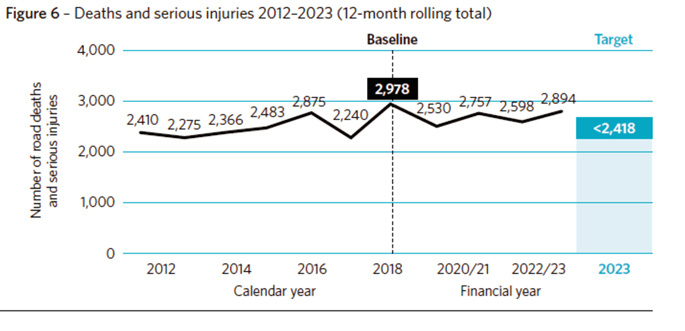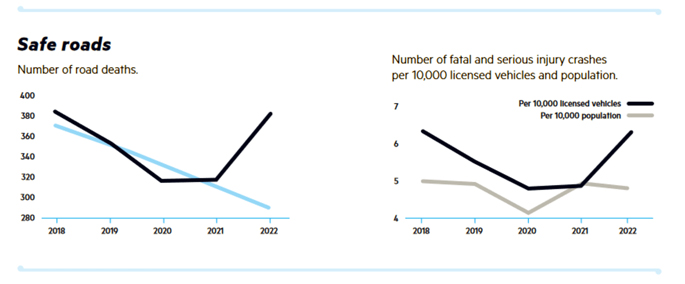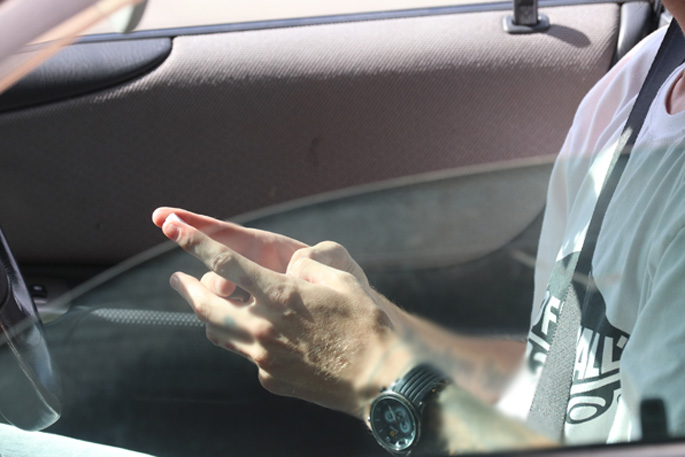Police have tripled the fines doled out for talking on your cellphone while driving in four years, to $6 million.
They have also levied a host more fines from mobile speed cameras since last year, despite falling short of their promise to use them much more.
This comes as deaths and serious injuries on the road hit their highest levels in five years, at the same time as the government is rowing back some of the Road to Zero measures, questioning their effectiveness.
 A graph shows the number of road deaths and serious injuries between 2012 and 2023 (12-month rolling total). Photo: Supplied / NZTA.
A graph shows the number of road deaths and serious injuries between 2012 and 2023 (12-month rolling total). Photo: Supplied / NZTA.Heading into the busy open road holiday season, new road policing figures show where the pressure is being put.
For the nine months to September, motorists were hit with $6m in cellphone fines compared to just a third of that in 2019 and $5m last year.
Almost 400,000 drivers copped a mobile speed camera fine in that same period, adding 40 per cent more to Crown coffers than from those fines a year ago. But camera use rose only four per cent and is well below target.
Speeding fines issued by police officers climbed more than 50,000 to 286,000 notices.
Also, seatbelt offences were well up on the last several years, costing drivers $5.4m for the nine months for 37,000 offences.
Police a year ago admitted to tweaking speed camera settings, and this led to tens of thousands more tickets for drivers doing just a little over the speed limit than before.
RNZ asked on Monday if they had changed the settings again, but police have not said.
Minister of Transport Simeon Brown, asked by RNZ if he would intervene if it appeared speed camera thresholds were set too low, says the settings are an operational matter for police.
While he's moving to row back the previous government's slower speed limits on more roads, and pruning back Road to Zero, Brown says: "I encourage all motorists to follow the road rules and sign-posted speed limits, particularly as we enter the busy holiday period.
"This government is committed to improving road safety while maintaining efficiency. This is not a case of advocating that motorists exceed sign-posted speed limits.
"We are focused on delivering safe infrastructure and targeting the highest contributing factors in fatal road crashes, allowing motorists to travel quickly and safely."
However, road deaths and serious injuries (DSIs) have been largely heading the wrong way.
 Graphics from the Police annual report 2022-23 shows road deaths and serious injuries going the wrong way. On the left, the light blue line is the target, and the dark blue line shows the actual numbers. The 2023 death toll is slightly lower than in 2022. Photo: Supplied / NZ Police.
Graphics from the Police annual report 2022-23 shows road deaths and serious injuries going the wrong way. On the left, the light blue line is the target, and the dark blue line shows the actual numbers. The 2023 death toll is slightly lower than in 2022. Photo: Supplied / NZ Police.Fatalities for the year to date, at 323, are below last year but higher than both 2020 (a Covid-19 year) and 2021.
Count in serious injuries too, and the total hits 2894, almost 20 percent above the target of 2418.
To get to the target - below 2085 by 2026 - looks a very long way off, especially as the number of kilometres travelled by the national fleet has just kept on rising, apart from a blip for Covid-19 lockdowns in 2020.
"DSIs from head-on, run-off road and intersection crashes have increased," Waka Kotahi says in its latest annual report.
"Low public support for speed changes in some areas", as well as the Cabinet cutting back how many slower limits it wanted, meant the agency's speed and infrastructure programme could not be delivered as planned, it says.
It's working to increase the pace of delivery of key safety infrastructure, including median barriers and roundabouts to reduce the DSI rate.
Among the grim figures is another one: Police, who committed several times in recent years to using mobile speed cameras more, after continually undershooting the target of 80,000-plus hours a year, undershot again in the 2022-3 year, registering just 61,000 hours, about the same level as previous years.
Back in 2021 police pledged differently: "Police acknowledges that our performance around breath testing and speed enforcement could have been better in previous years and we are committed to improving this with our road safety partners moving forward," they said.
Breath testing did rise last year, to 2.6 million tests, though the target is three million.
But mobile speed camera use by officers rose just four per cent in 2022-23 - while at the same time infringement notices from them rose 21 per cent and fines 40 per cent.
RNZ has asked police why the notices and fines are rising so much faster than deployment. Waka Kotahi takes over speed cameras from police next year.
Static speed camera fines are down, to $21m for the period from $26m, and a hefty $38.7m in 2019 for the same period.



5 comments
Cellphones
Posted on 20-12-2023 10:21 | By Sycamore2
Perhaps a fine of $1000 for using a phone while driving would be a deterrent and a decent punishment.
Follow QSLDs lead in NZ
Posted on 20-12-2023 12:45 | By Bourney
It is illegal for learners or drivers under age 25 to use a phone in any way while driving, including using maps, Bluetooth or hand-free. The penalties for a learner driver are also more severe. In addition to the $1,161.00 fine and four demerit points, learner drivers will also lose their license after one mobile phone offence. If you are a passenger in a car with a learner or P1 licence driver under 25, using a mobile phone on loudspeaker is also illegal as it will distract the driver. Adult drivers will be fined $1,161 and have 4 demerit points recorded against their traffic history for using a mobile phone illegally while driving. This includes when you're stopped at traffic lights or stopped in traffic. Double demerit points apply for second or subsequent mobile phone offences committed within 1 year after an earlier offence. This came in 2023.
@Sycamore2
Posted on 20-12-2023 13:04 | By morepork
If your income is several thousand dollars a day, you won't be too troubled by $1000 fine. So all you have done is unfairly attack the less affluent. My point is that money is always relative... I agree with you that SOMETHING serious needs to be done about cell phone usage in moving vehicles, and perhaps stiffer fines as disincentive should be part of that. Maybe we should REQUIRE that people misusing their cell phone should be fined AND made to install hands-free connection in their vehicle. If they already have hands-free but weren't using it, then the penalty could be increased.
@ Sycamore2
Posted on 20-12-2023 14:42 | By Yadick
Absolutely agree with you. The current fine of $150 is far too low. $1000 would certainly rock a few worlds.
@Bourney
Posted on 22-12-2023 10:35 | By morepork
Thanks for this information. It seems harsh, but it isn't really because we all have control over when and how we use our cell phones. (Not me; I don't use one...) Like most other drivers, I am fed up with seeing people driving while on the phone, and not being aware of the traffic situation around them. Queensland is sending a message to newly qualified drivers in particular, emphasising the seriousness of phoning and driving. We might do well to do something similar.
Leave a Comment
You must be logged in to make a comment.